News
Research Highlight: Siblings Mira Chu-Shore ’25 and Tai Chu-Shore ’26 Present at Biomedical Engineering Society Conference
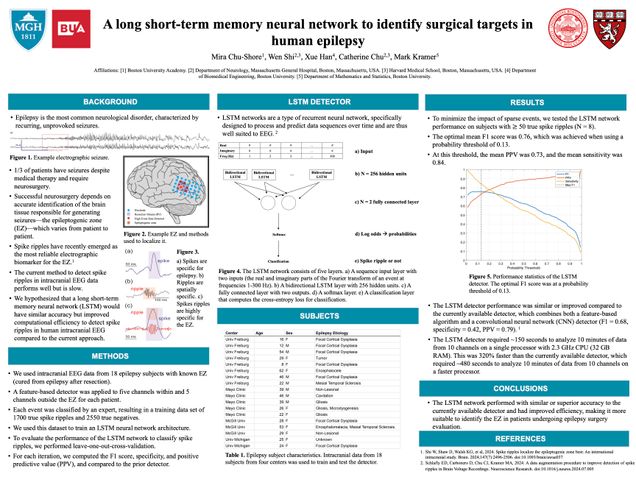 Last fall, siblings Mira Chu-Shore '25 and Tai Chu-Shore '26 presented at the annual Biomedical Engineering Society conference in Baltimore, MD, as part of the conference's two-hour poster session for high school students. Tai's poster, entitled "Blood Vessel Reflectance as a Tool for Assessing DBS Efficacy in Mice," focused on how blood vessels in mouse brains react to deep-brain stimulation while the mouse is still awake. Mira's poster, "A Long Short-Term Memory Neural Network to Identify Surgical Targets in Human Epilepsy," built upon her senior thesis research.
Last fall, siblings Mira Chu-Shore '25 and Tai Chu-Shore '26 presented at the annual Biomedical Engineering Society conference in Baltimore, MD, as part of the conference's two-hour poster session for high school students. Tai's poster, entitled "Blood Vessel Reflectance as a Tool for Assessing DBS Efficacy in Mice," focused on how blood vessels in mouse brains react to deep-brain stimulation while the mouse is still awake. Mira's poster, "A Long Short-Term Memory Neural Network to Identify Surgical Targets in Human Epilepsy," built upon her senior thesis research.
Of their experience at the conference and the path that led them there, Tai shared:
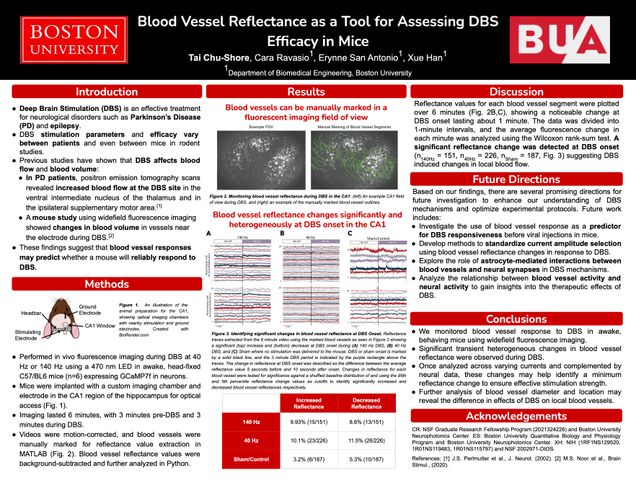
"From last summer until now, I have been visiting the Han Lab at BU and doing projects under two of the grad students working there. They told me about this conference and worked with me on creating the poster and practicing for the poster session. I told my sister about it, and she worked on creating a poster so she could also go. We both had to submit our research before getting in, including a basic outline of what we were going to prove and how. There were a lot of other people [at the conference], but I'm not quite sure how many, as I was presenting my poster the whole time."
Congratulations to Tai and Mira on your fascinating research and successful poster presentations!
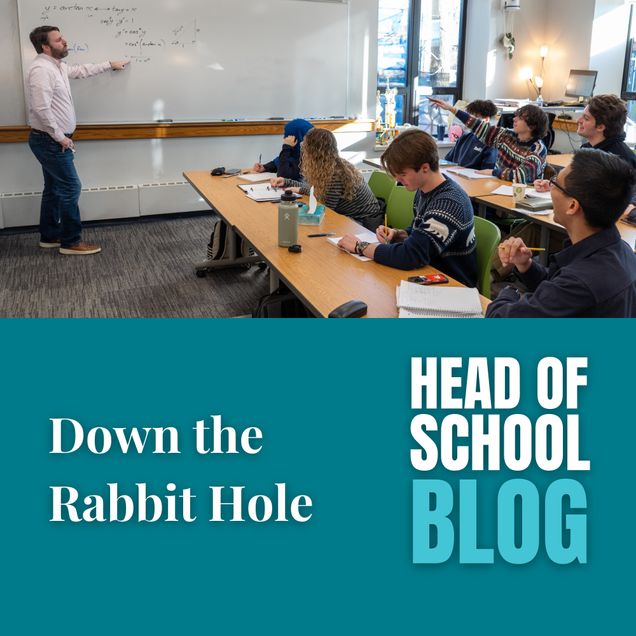
Down the Rabbit Hole
In a recent calculus class I visited, a student asked, “Can you have a function where you can take a first derivative but not a second derivative?” The question was related to the topic the class was discussing, but tangentially (excuse the pun). The teacher smiled, paused, and proceeded to write an example on the board where the proposition was true – taking time to unpack it for the whole class. The teacher had the knowledge to come up with an answer on the spot. He had the experience to know that he could get through the explanation quickly and still cover what was on tap for the day. And, most importantly, he recognized that engaging in that moment would reward that student’s curiosity and send a signal to all of the students about the value of their questions.
We are incredibly fortunate to be at a school with a faculty that has the disposition and content knowledge necessary to confidently and efficiently travel down the rabbit holes that our students open. I saw it recently in a Latin class where a student wondered about the placement of certain words in a sentence and the teacher explained the way long and short vowels may have met a poet’s rhythmic constraints; in a geometry classroom where the teacher engaged with a student who had a theory about the effect of moving from a five-sided to a six-sided star shape; in a music class, when, in response to a student’s question about how Spanish composers differed from their contemporaries, the teacher took the time to demonstrate the subtle differences on the piano and filled in the relevant music theory. I could go on.
Too often, high school is a place where even highly capable, motivated students lose their natural curiosity. That doesn’t have to happen. Curiosity can be – and has to be – nurtured. This is one way to do that.
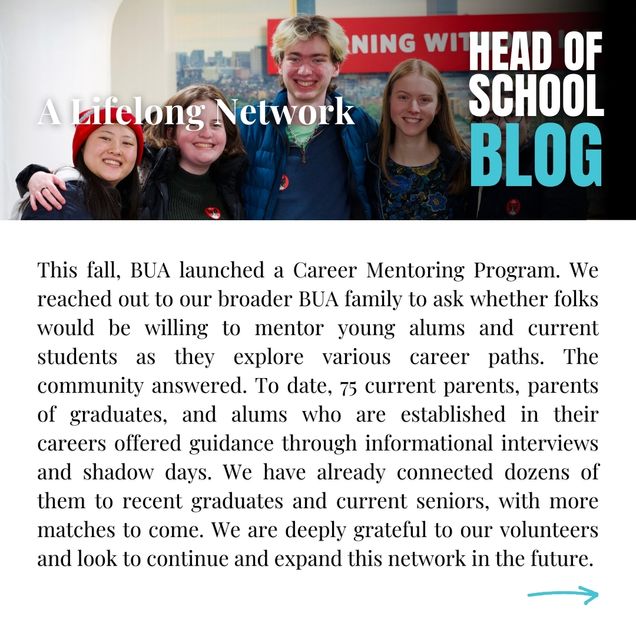
A Lifelong Network
This fall, BUA launched a Career Mentoring Program. We reached out to our broader BUA family to ask whether folks would be willing to mentor young alums and current students as they explore various career paths. The community answered. To date, 75 current parents, parents of graduates, and alums who are established in their careers offered guidance through informational interviews and shadow days. We have already connected dozens of them to recent graduates and current seniors, with more matches to come. We are deeply grateful to our volunteers and look to continue and expand this network in the future.
While some of our students and young alums can tap into their own professional networks through family and friends, many cannot. This program seeks to provide equitable access to career advice and mentorship across a broad range of fields. It gives the mentors another way to give back to a school community that, for many, has been transformational. And, for all, it will form connections and friendships, some of which will hopefully last for many years.
Reva Machanavajhula ’28 Selected For MA State Junior Golf Team
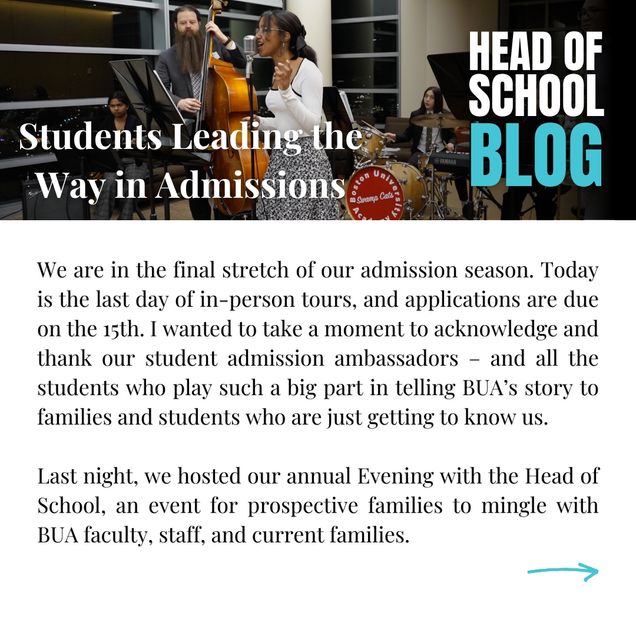
Students Leading the Way in Admissions
We are in the final stretch of our admission season. Today is the last day of in-person tours, and applications are due on the 15th. I wanted to take a moment to acknowledge and thank our student admission ambassadors – and all the students who play such a big part in telling BUA’s story to families and students who are just getting to know us.
Last night, we hosted our annual Evening with the Head of School, an event for prospective families to mingle with BUA faculty, staff, and current families. One common refrain I heard from our visitors was how amazing our students have been in the admission process – including last night. It was a cold one. Bundled up, BUA admission ambassadors were outside greeting visitors and helping them find their way to the event. That warm greeting on a frigid night made a real impression. I heard about how wonderful our student-led tours are – about the poise, humor, knowledge, maturity, and candor those tour guides demonstrate as they walk the halls with prospective families and students. I heard about how well our student speakers and panelists at our Open Houses represent themselves and the school – and about the signal it sends that we put students front and center this way, trusting them with roles sometimes reserved for adults in other schools. I heard from prospective families who were surprised that the live music at last night’s event was from our student select Jazz Combo – the Swamp Cats; about student volunteers at our Girl Power event and other admission events; and so much more.
Students, of course, are not the only ones who make our admission process so special. Parents, alums, faculty, and staff all play big roles. But it feels right to shine a light on the kids in this moment. To quote one parent from last night, “When you have kids like that, of course they should be the ones doing the talking. When we hear them, we know that this is the place for our son because we want him to be in school with kids like that.”
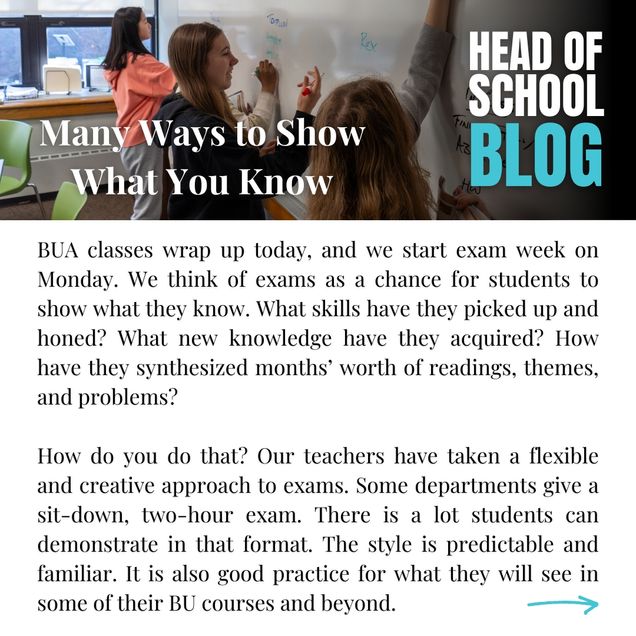
Many Ways to Show What You Know
BUA classes wrap up today, and we start exam week on Monday. We think of exams as a chance for students to show what they know. What skills have they picked up and honed? What new knowledge have they acquired? How have they synthesized months’ worth of readings, themes, and problems?
How do you do that? Our teachers have taken a flexible and creative approach to exams. Some departments give a sit-down, two-hour exam. There is a lot students can demonstrate in that format. The style is predictable and familiar. It is also good practice for what they will see in some of their BU courses and beyond. Some courses have moved to in-person, one-on-one interview formats – most commonly in history classes, but recently in geometry as well. In dialogue with students, teachers probe a range of topics spanning the semester’s content and requiring students to flex their critical thinking muscles. Others assign papers, knowing that there is no better way to hone your writing than by practice. Still others have offered up avenues for projects – showcases for content mastery, creativity, and sometimes collaboration. The end result is a week that gives students multiple ways to show what they know, some playing more to a given student’s strengths than others. The variation from day to day adds some color to the week and creates chances for more flexibility in terms of time; some students find time to get lunch with their friends (and even do some holiday shopping) between exam days. And while exam week may never be everybody’s favorite, some students say that they kind of like it.
Wishing all of our students good luck next week!
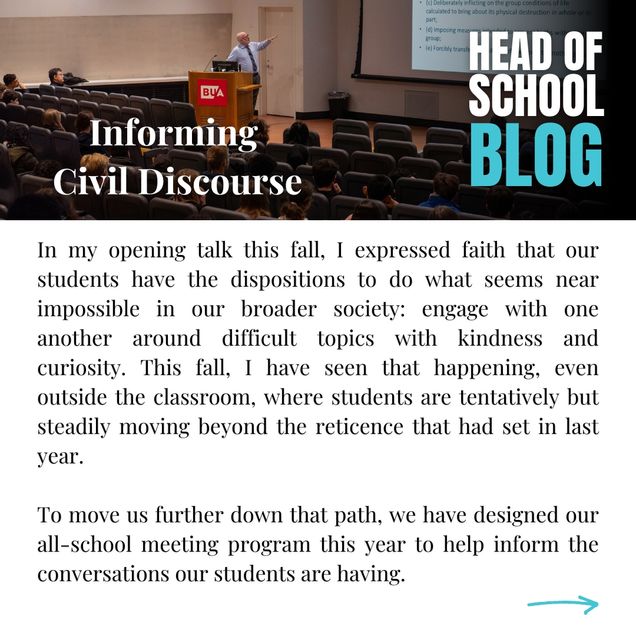
Informing Civil Discourse
In my opening talk this fall, I expressed faith that our students have the dispositions to do what seems near impossible in our broader society: engage with one another around difficult topics with kindness and curiosity. This fall, I have seen that happening, even outside the classroom, where students are tentatively but steadily moving beyond the reticence that had set in last year.
To move us further down that path, we have designed our all-school meeting program this year to help inform the conversations our students are having. Shortly before the election, BU history professor Dr. Bruce Schulman talked about several key presidential elections in the 20th century with the goal of helping us all understand how we have landed with this particular flavor of two-party election in 2024. We then welcomed Dr. Nancy Harrowitz, the Director of BU’s Elie Wiesel Center for Jewish Students, and Dr. Mohammad Zaman, the Director of BU’s Center on Forced Displacement. They shared their experiences leading university-wide working groups last year on anti-Semitism and Islamophobia respectively, as well as their opinions on campus climates nationally in the wake of October 7. Just this week, BU professor Dr. Tim Longman, one of the world’s leading authorities on the Rwandan genocide and its aftermath, unpacked that tragic period of history. He also walked our students through the origins of the term “genocide,” the definition in the UN Convention, and how it might or might not apply to recent events in Ukraine and Gaza. Later this winter, Dr. Veronika Wirtz from BU’s School of Public Health will join us to talk about her research about misinformation on TikTok, specifically related to the marketing of Ozempic, but with applicability to many areas. And there are some other pieces in the works. This is all a supplement to the deep work our students do with their teachers in class, particularly in history, where several of our offerings are meant to create a factual context for understanding today’s world.
We owe it to our students to give them what they are unlikely to get from social media and echo-chamber news sources: thoughtful, reliable context to empower them to form their own opinions and test them against others’.

Research Highlight: Metch Nelson ’25 Investigates Disparities in Healthcare via Large-Scale Genetic Research Studies
 For his senior thesis project, Metch Nelson '25, in collaboration with Dr. Brett Maricque at Washington University in St. Louis, is researching the disparities in healthcare in the context of large-scale genetic research programs. Specifically, Metch's research focuses on the National Institute of Health's All of Us Program, which aims to improve health care by building a diverse database that can inform thousands of studies on a variety of health conditions. Below, Metch shares more about his thesis research and why he was inspired to take on this work.
For his senior thesis project, Metch Nelson '25, in collaboration with Dr. Brett Maricque at Washington University in St. Louis, is researching the disparities in healthcare in the context of large-scale genetic research programs. Specifically, Metch's research focuses on the National Institute of Health's All of Us Program, which aims to improve health care by building a diverse database that can inform thousands of studies on a variety of health conditions. Below, Metch shares more about his thesis research and why he was inspired to take on this work.
Tell us about your research.
My research focuses on the All of Us Research Program, a large-scale genetic initiative designed to accelerate precision medicine by collecting diverse health data from one million or more participants across the US. The program's goal is to improve healthcare outcomes by ensuring personalized treatment approaches. I am specifically examining the program's history, motivations, leadership, participant engagement, and challenges, with an emphasis on understanding and addressing the lack of diversity in genomic datasets.
How did you become interested in this topic?
My passion for equitable healthcare access arose because of my family's Haitian background. The realization that underrepresented communities are often excluded from genetic research resonated with me.
What is the All of Us program?
The All of Us Research Program is an initiative by the National Institutes of Health (NIH) to create one of the most diverse health databases in the world. By gathering genetic, environmental, and lifestyle data from a wide range of participants, the program aims to enable researchers to develop more precise and effective ways to prevent and treat diseases.
How do underrepresented communities get left out of these large-scale genetic studies?
Typically, these people get left out of programs for two main reasons: historical distrust and lack of outreach. Because of their history with science through movements like eugenics, they're typically not interested in participating in these programs. Outreach is also a huge issue since oftentimes these programs don't reach out to more diverse neighborhoods because of the potential for these people to not be able to participate well enough because of their lack of resources.
What are some of the implications for underrepresented communities in terms of health outcomes and access to health care?
The main implications are worsened health outcomes and lack of access. Medical treatments are often less effective because research often overlooks these populations’ unique needs since there's a lack of participation in these genomic projects. Oftentimes, medical treatments are unaffordable for these underrepresented people.
What are some strategies that could be implemented to address these disparities?
The main strategies that could be implemented are structural changes within these large genomic projects. Community engagement is really important; if researchers engage in these communities – this could be holding workshops or information sessions – then trust can be built between these underrepresented people and the researchers. Incentivizing participation through some sort of financial compensation or support could increase their participation. Lastly, establishing a really strong ethical policy for these types of studies could ease underrepresented people's distrust in the research.

Lunch with Students
As I do every year, I’ve been hosting lunches this fall in my office with groups of seniors. I’ll do the same with juniors in the winter and then with all 9th and 10th grade advisory groups in the spring. On any given day, you can smell the Raising Cane’s chicken tenders, Chipotle burritos, and Otto pizza down the hall.
There is no agenda for the meetings. I’ll often ask how things are going to get a pulse check. The most fun part is when students start asking me questions – about how we do admissions, how the budget works, our relationship with BU, how we choose ASM speakers, how the curriculum changes, how financial aid works, where the school is going. The time flies by. Their curiosity comes through, but there’s more than that. They really care about their school. They feel a sense of pride and ownership. And they have good ideas. I’m looking forward to the next one!
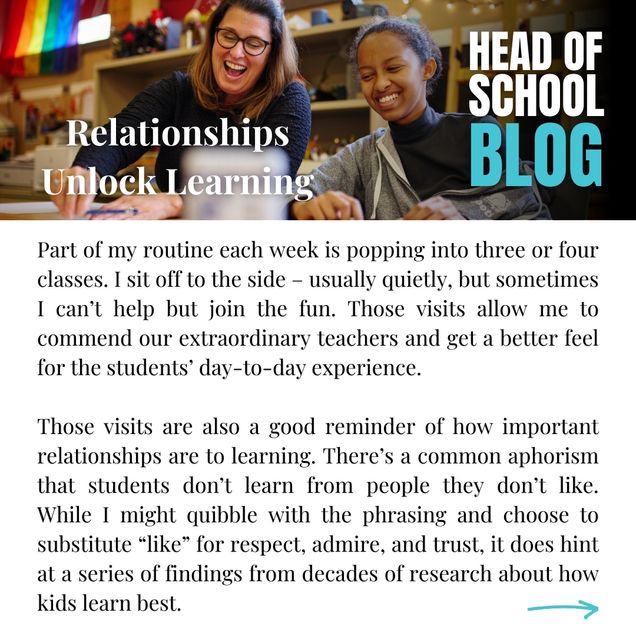
Relationships Unlock Learning
Part of my routine each week is popping into three or four classes. I sit off to the side – usually quietly, but sometimes I can’t help but join the fun. Those visits allow me to commend our extraordinary teachers and get a better feel for the students’ day-to-day experience.
Those visits are also a good reminder of how important relationships are to learning. There’s a common aphorism that students don’t learn from people they don’t like. While I might quibble with the phrasing and choose to substitute “like” for respect, admire, and trust, it does hint at a series of findings from decades of research about how kids learn best. Feeling seen, known, and loved by your teacher opens the door to learning. It creates a sense of emotional comfort and belonging. It allows students to make mistakes, admit what they don’t know, and ask for help without shame or fear of being discovered. In those classrooms, teachers can set high expectations and students want to meet them. Teachers can share their passion for a subject, and students get swept up in that passion. David Brooks wrote about these ideas in his 2019 New York Times opinion piece titled “Students Learn from People They Love.”
Just this fall, I saw so many ways teachers create that environment at BUA. I heard a classics teacher share a story of feeling particularly challenged in graduate school and the associated worry about underperforming – a moment of vulnerability that invited students to do the same. I observed an art teacher walking around from student to student offering one-on-one coaching – saying just enough to help the students take the next step and giving them the tools and confidence to do it themselves. I heard a science teacher share a fun childhood story to illustrate a tricky molecular concept. A music teacher in chorus riffing on the way that Spanish composers broke rules and the associated music-theory niceties. A math teacher offering, “You guys came up with a neat approach I hadn’t thought of.” A classics teacher making a Star Wars joke about Tataouine and its multiple suns to shed light on (sorry) the singular vs. plural ending to a noun.
I could go on. As Thanksgiving approaches, please join me in thanking our teachers for being the people our students deserve.